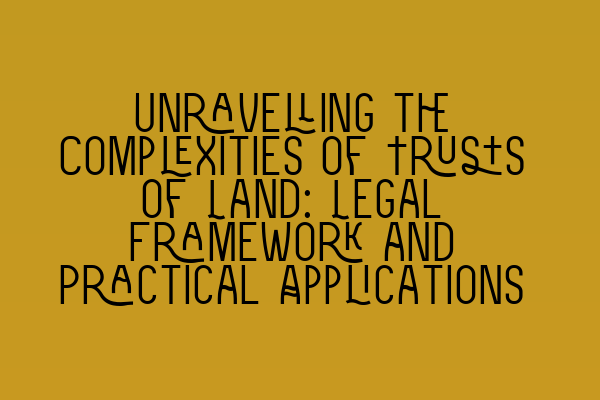Unravelling the Complexities of Trusts of Land: Legal Framework and Practical Applications
Trusts of land are a fascinating area of property law that can often be complex and misunderstood. Whether you are a solicitor, property law professional, or simply someone interested in understanding trust law, it is essential to grasp the legal framework and practical applications of trusts of land.
In this blog post, we will delve into the intricacies of trusts of land, examining their legal foundations, types, formation, and practical implications. Let’s explore this captivating area of property law together.
The Legal Framework of Trusts of Land
Trusts of land are governed by the Trusts of Land and Appointment of Trustees Act 1996 (TOLATA), which provides the legal basis for establishing and managing trusts involving land. TOLATA sets out the rights and obligations of trustees, beneficiaries, and other parties involved in trusts of land.
Under TOLATA, a trust of land arises when property is held by trustees for the benefit of one or more beneficiaries. This means that the trustees hold the legal title to the land while the beneficiaries have equitable interests in the property.
Trusts of land can be express trusts, resulting trusts, or constructive trusts. Express trusts are explicitly created by a settlor who transfers legal title to the trustees. Resulting trusts occur when property is presumed to be held on trust for the person who contributed to its purchase. Constructive trusts arise when the Court declares that someone holds the land under a trust to prevent unconscionable behavior.
Formation and Requirements
To form a trust of land, certain requirements must be met. First and foremost, there must be a valid declaration of trust, which clearly identifies the property, trustees, and beneficiaries. The declaration must also specify the beneficiaries’ interests and any conditions or restrictions.
Additionally, there must be a transfer of legal ownership to the trustees and an intention to create a trust. This intention can be express or implied from the parties’ conduct.
It is important to note that trusts of land must adhere to the formalities set out in the Law of Property Act 1925, such as being in writing and signed by all parties involved. Failure to comply with these formalities may render the trust unenforceable.
Key Considerations and Practical Applications
Trusts of land have several practical applications and considerations. One common scenario is when a property is jointly owned, and the owners wish to regulate their respective rights and interests. In such cases, a trust of land can clarify and protect the parties’ rights, preventing disputes and uncertainties.
Trusts of land can also be useful in commercial settings, such as joint ventures or property development projects. By establishing a trust, the parties can allocate shares, define management responsibilities, and govern the sale or lease of the property.
In the context of family law, trusts of land are often employed to safeguard the interests of family members, particularly when cohabiting couples separate. A trust of land can provide a mechanism for dividing the property’s ownership and dealing with financial contributions and disputes.
Landlords and tenants can also utilize trusts of land to protect their respective interests. By creating a trust, the landlord can maintain control over the property while allowing the tenant to occupy and enjoy it.
Conclusion
Trusts of land are a vital aspect of property law, offering a flexible framework for managing and protecting the interests of parties involved in land ownership. By understanding the legal principles, formation requirements, and practical applications of trusts of land, solicitors and property law professionals can navigate this complex area with confidence.
If you are preparing for the SQE exams or looking for practice materials, be sure to check out our related articles:
- SQE 1 Practice Exam Questions
- SQE 1 Practice Mocks FLK1 FLK2
- SQE 2 Preparation Courses
- SQE 1 Preparation Courses
- SRA SQE Exam Dates
At SQE Property Law & Land Law, we offer comprehensive courses and resources to help you prepare for the SQE exams and excel in your legal career. Contact us today to learn more and take the next step towards success.
